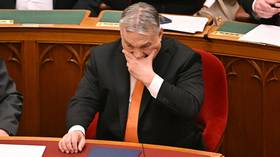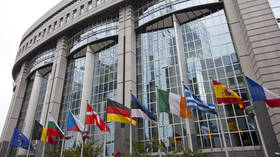Kremlin responds to Orban’s border fears

Moscow has dismissed as “groundless” concerns voiced by the Prime Minister of Hungary Viktor Orban about once-again sharing a border with Russia. Kremlin spokesman Dmitry Peskov told reporters on Wednesday that Russia poses no threat to any state that is not hostile to it.
On Tuesday Orban mentioned “bad memories” from the Soviet era after meeting with leaders of Poland, Slovakia and the Czech Republic in Prague. Commenting on the Ukraine conflict, he said Hungary’s top national-security concern was to “not share a border with Russia.”
Asked at Wednesday’s press briefing to comment on Orban’s words, Peskov said that “contrary to what is now being repeatedly claimed with enviable consistency in the EU, Russia does not pose any danger to any country that is not hostile to Russia, or trying to become an anti-Russia, so [Orban’s] fears in this regard are groundless.”
Earlier this week, the Hungarian parliament voted to ratify Sweden’s application to join NATO. Budapest had held up Stockholm’s request for almost two years, citing the fellow EU member’s criticism of Orban’s domestic policies. It dropped its opposition after a deal to buy four more Swedish Saab Gripen fighter jets.
Orban made the border comment in the course of explaining Budapest’s policy towards Kiev, which has not been in lockstep with the rest of the EU and NATO. Hungary has provided Ukraine with humanitarian aid but refused to send any weapons, to allow others to ship military supplies through its territory, or to train any Ukrainian troops – despite strong pressure from both Washington and Brussels.
The Hungarian prime minister this week also repeated his long-standing position that the Ukraine conflict can only end through negotiations, which should start as soon as possible in order to save lives.
Both Russian President Vladimir Putin and Foreign Minister Sergey Lavrov have repeatedly voiced Moscow’s readiness to settle the Ukraine conflict through negotiations. Russia has blamed Ukraine and its backers in the West for refusing meaningful dialogue, however, leaving Moscow no choice but to continue pursuing its goals on the battlefield.













